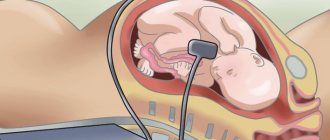The expectant mother knows that after the birth of her baby, it will be more difficult for her to get a good night's sleep. But many do not even suspect that even during pregnancy, especially in the third trimester, one can only dream of a restful sleep all night long.
In fact, it is possible to sleep more than usual during the first trimester of pregnancy. It is normal for a woman to feel tired as the body protects and supports the developing baby. The placenta, which nourishes the fetus before birth, is just being formed, so in the body of the expectant mother, the heartbeat quickens and more blood is produced in the body.
Typically, during pregnancy, after the first trimester, most women experience problems with deep and uninterrupted sleep.
Why pregnant women may have trouble sleeping
The first and most important cause of sleep problems during pregnancy is an increase in the size of the fetus. This makes it difficult to find a comfortable sleeping position.
If a woman has slept on her back or stomach, she may have trouble sleeping on her side, as doctors recommend. Additionally, changing sleep positions becomes more difficult as pregnancy progresses. Other common physical symptoms that may also interfere with sleep include:
- Frequent urge to urinate.
The kidneys work harder to filter the increased volume of blood passing through the body, and this process creates more urine. The second factor is that as the baby grows and the uterus becomes larger, the pressure on the bladder increases. Third, amniotic fluid is renewed every 2-3 hours, which cannot affect the pregnant woman’s diuresis day or night. Nocturnal urination at night also increases if the child is especially active at night. - Cardiopalmus.
The heart rate increases to ensure good blood flow to the uterus. Moreover, the more blood enters the uterus, the faster the heart works to send enough blood to the rest of the organs. - Difficulty and rapid breathing
. The increase in hormones during pregnancy causes you to breathe more deeply and may feel like you are short of breath. In the future, breathing may be difficult as the enlarged uterus takes up more space, which puts pressure on the diaphragm. - Lower back pain and leg cramps.
Extra weight during pregnancy affects leg and back pain. During pregnancy, the body also produces the hormone relaxin, which helps prepare for childbirth. One of the effects of relaxin is to loosen ligaments throughout the body, making pregnant women less stable and more susceptible to injury, especially in the back. - Heartburn and constipation.
Many pregnant women experience heartburn, which occurs when stomach contents back up into the esophagus. During pregnancy, the entire digestive system slows down and food stays in the stomach and intestines longer, which can cause heartburn or constipation. These sensations may worsen in the last trimester of pregnancy, when the growing uterus puts pressure on the stomach or colon.
Sleep problems can also arise for other reasons. Many pregnant women experience dreams that are more vivid than usual, and some even experience nightmares.
Stress also interferes with normal sleep. A pregnant woman may be worried about her baby's health or nervous about giving birth. All of these feelings are normal and can cause insomnia.
What can't you do?
Sometimes pregnant women resort to strange, if not dangerous, methods of getting rid of sleep disorders. Below are the most dangerous methods that should never be used:
- Alcohol intake
. Some ladies believe that a small amount of alcohol is safe for the mother and fetus, and will also help you fall asleep faster. This should not be done during pregnancy under any circumstances. It's hard to even imagine what harm this could cause to the baby. - Uncontrolled use of medications
. Pregnant women are prohibited from taking sedative and sleeping pills without a doctor's prescription. You can read about this on any annotation for the medicinal product. But no matter how much they talk about it, the statistics are such that sometimes pregnant women still take potent medications in order to fall asleep more soundly. - Overeating at night
. There is an opinion among pregnant women that if you eat well at night, sleep will come faster and insomnia will subside. It is not clear how this can be explained, but this opinion is firmly rooted in the heads of some women. The only thing that can be said is that this method of treating insomnia in the 3rd trimester of pregnancy is the safest of all unwanted methods. - Sex
. This method of falling asleep quickly is undesirable, since it is not suitable for all pregnant women. Before using this method in the fight against insomnia, you need to make sure that there are no contraindications, so as not to aggravate your poor health.
The first two undesirable methods are prohibited from being used at any stage of pregnancy, regardless of the woman’s health status and other circumstances. The third and fourth methods are controversial. Their use is allowed if they do not cause damage to the body of the expectant mother and the fetus.
Finding a comfortable sleeping position
At the beginning of pregnancy, you need to get used to sleeping on your side. The most comfortable position during pregnancy is to sleep on your side with your knees bent. This position is easier on the heart because it keeps the baby's weight from putting pressure on the large vein (called the inferior vena cava), which carries blood back to the heart from the feet. Some doctors recommend that pregnant women sleep on their left side. Since the liver is on the right side of the abdomen, this helps protect it from the pressure of the uterus. Sleeping on your left side also improves blood circulation to the heart and ensures better blood flow to the fetus, uterus and kidneys.
No need to worry about rolling over on your back at night. Changing positions is a natural part of sleep that cannot be controlled. Most likely, in the third trimester of pregnancy, a woman will automatically choose a comfortable position for herself. You can try experimenting with sleeping pillows to find the most comfortable position. Some women say that placing a pillow under their stomach or between their legs helps them sleep. Additionally, using a folded pillow or rolled blanket under your lower back can help relieve pressure on your spine.
Insomnia as a sign of pregnancy
Most women know that the most common sign of pregnancy is toxicosis. However, not everyone knows that an interesting situation can be characterized not only by such a deterioration in the condition. Often, at the beginning of pregnancy, women experience insomnia. Many believe that she tells the ladies about their interesting position.
Indeed, there is a hypothesis that has been repeatedly proven by scientists that insomnia is a sign of pregnancy.
First of all, the development of insomnia (disturbed night sleep) in a woman occurs due to serious changes in the functioning of the body, which spends a lot of effort to ensure that the embryo develops healthy. As soon as the male gamete penetrates the egg, fertilization occurs - the female cell becomes dense and begins to gradually move to the uterine cavity, where it subsequently becomes fixed and begins its active development.
How much milk is there, is the baby enough, how to increase lactation while breastfeeding are the eternal questions of young mothers. After all, breast milk is recognized as the best food for newborns. Read more in the article: “how to increase lactation for a nursing mother.”
At this moment, the body begins to produce progesterone in large quantities, because the normal development of the embryo depends on it, as well as its attachment to the wall of the uterus and its subsequent retention there. Also, this sex hormone acts in the body of a pregnant woman in the form of a powerful antidepressant. That is why insomnia can be considered as a sign of pregnancy before the delay, because it appears due to an increase in the production of progesterone, which is necessary for the female body for the development of the embryo.
Tips for a good night's sleep
- It is necessary, as much as possible, to remove caffeinated drinks from the diet, such as cola, coffee and tea.
- It is recommended not to drink a lot of fluids or eat for several hours before going to bed. But it is important to make sure that your body gets plenty of nutrients and fluids throughout the day. It is beneficial to eat more for breakfast and lunch, rather than before bed. If nausea is a problem, try eating a few crackers before going to bed.
- It is important to go to bed and wake up at the same time every day.
- Avoid physical activity right before bed. Instead, you can read a book or drink a warm decaffeinated drink.
- The body must get enough calcium and magnesium to reduce nighttime leg cramps.
- Try yoga or other relaxation techniques that help you unwind after a stressful day.
Sources
- Schieffler DA., Matta SE. Evidence to Support the Use of S-Adenosylmethionine for the Treatment of Post-Concussive Sequelae in the Military. // Mil Med - 2021 - Vol - NNULL - p.; PMID:33900393
- Kalmbach DA., Ahmedani BK., Gelaye B., Cheng P., Drake CL. Nocturnal cognitive hyperarousal, perinatal-focused rumination, and insomnia are associated with suicidal ideation in perinatal women with mild to moderate depression. // Sleep Med - 2021 - Vol81 - NNULL - p.439-442; PMID:33839373
- Salari N., Darvishi N., Khaledi-Paveh B., Vaisi-Raygani A., Jalali R., Daneshkhah A., Bartina Y., Mohammadi M. A systematic review and meta-analysis of the prevalence of insomnia in the third trimester of pregnancy. // BMC Pregnancy Childbirth - 2021 - Vol21 - N1 - p.284; PMID:33836686
- Kalmbach DA., Cheng P., Drake CL. A pathogenic cycle between insomnia and cognitive arousal fuels perinatal depression: exploring the roles of nocturnal cognitive arousal and perinatal-focused rumination. // Sleep - 2021 - Vol - NNULL - p.; PMID:33830248
- Kalmbach DA., Cheng P., Roth T., Swanson LM., Cuamatzi-Castelan A., Roth A., Drake CL. Examining Patient Feedback and the Role of Cognitive Arousal in Treatment Non-response to Digital Cognitive-behavioral Therapy for Insomnia during Pregnancy. // Behav Sleep Med - 2021 - Vol - NNULL - p.1-20; PMID:33719795
- Taybeh EO. A focus on postpartum depression among Jordanian mothers. // Int J Soc Psychiatry - 2021 - Vol - NNULL - p.207640211000100; PMID:33719679
- Saito J., Ishii M., Miura Y., Yakuwa N., Kawasaki H., Suzuki T., Yamatani A., Sago H., Tachibana Y., Murashima A. Brotizolam During Pregnancy and Lactation: Brotizolam Levels in Maternal Serum , Cord Blood, Breast Milk, and Neonatal Serum. // Breastfeed Med - 2021 - Vol - NNULL - p.; PMID:33666494
- Li C., Huo L., Wang R., Qi L., Wang W., Zhou X., Zhou Y., Zhang X. The prevalence and risk factors of depression in prenatal and postnatal women in China with the outbreak of Corona Virus Disease 2019. // J Affect Disord - 2021 - Vol282 - NNULL - p.1203-1209; PMID:33601697
- Khoury JE., Atkinson L., Bennett T., Jack SM., Gonzalez A. COVID-19 and mental health during pregnancy: The importance of cognitive appraisal and social support. // J Affect Disord - 2021 - Vol282 - NNULL - p.1161-1169; PMID:33601691
- Lu Q., Zhang X., Wang Y., Li J., Xu Y., Song X., Su S., Zhu X., Vitiello MV., Shi J., Bao Y., Lu L. Sleep disturbances during pregnancy and adverse maternal and fetal outcomes: A systematic review and meta-analysis. // Sleep Med Rev - 2021 - Vol58 - NNULL - p.101436; PMID:33571887
How can the doctor help?
Many people are interested in whether an expectant mother can take sleeping pills to normalize her condition? The answer will be unequivocal - no. Insomnia in early pregnancy cannot be treated with medications; they can only be prescribed as an exception and only under the strict supervision of a doctor. This is due to the teratogenic effect of most drugs in this category. The use of potent drugs can cause irreversible degenerative processes in the fetal body and disrupt its normal formation.
To avoid fatal consequences, the doctor may prescribe decoctions of sedative herbs. Valerian, chamomile, mint, hawthorn, and lemon balm have a calming effect on the nervous system.
However, before using herbs, you should definitely consult with a specialist, since the expectant mother may be allergic to plant materials.







